When someone says “spy movie,” chances are your mind immediately goes to the likes of James Bond, Mission Impossible, or maybe this weekend’s smash-hit The Man from U.N.C.L.E. (which I very highly recommend).
But while the flashy casanovas and their gadgets have their place in the theatres, there are also quite a few political thrillers like The Fugitive and The Hunt for Red October that get overlooked. (Don’t worry. I’m sure I’ll write an article to praise Tom Clancy's movies soon enough.) These films are just as full of undercover action, but they’re grittier and provide a more believable take on the age-old spy genre. However, of all the hyper-realistic espionage films I’ve encountered over the years, there is one saga that stands above the rest: the Bourne trilogy.
For those of you who haven’t seen this series (or only know of it because The Bourne Legacy was the closest thing we got to a Hawkeye origin story), allow me to explain in my usual spoiler-free fashion why these decade-old movies are still worth your time today.
Hogwarts Jason Bourne, A History
Like most good sagas, the tale of Jason Bourne started out as a book written by Robert Ludlum, beginning in 1980 with The Bourne Identity. The novel eventually gave way to a trilogy, featuring the additional books The Bourne Supremacy and The Bourne Ultimatum. Many readers and moviegoers actually consider the books to be one of the top spy series of all time, right alongside James Bond and all the rest.
Warner Bros. made a television-movie of the first novel in 1988: it starred Richard Chamberlain and featured slightly more loyalty to the book’s original Cold War-era storyline. However, most fans tend to be more familiar and accepting of the film adaptation starring Matt Damon made by Universal Studios in 2002. Though the plot was altered and set in the modern world ("modern" meaning the turn of the century, so some of the computers already look obsolete now), the fascinating script and Damon’s exceptional performance paved the way for the other two books to be adapted in 2004 and 2007. They drifted further and further from the books as they went, but they formed their own new, coherent storyline that still satisfied viewers overall.
Then, of course, Universal tried to bring the saga back by casting Jeremy Renner as a spy of Bourne’s caliber in the 2012 movie The Bourne Legacy (which was the first film that didn’t really have anything in common with its original novel besides the title).
In Legacy's defense, it did a decent job of incorporating footage from the previous films to set up its story… but even so, most Bourne fans generally choose to ignore it. For one thing, it tried to introduce the idea of a Captain-America-esque "super-soldier" program that took away from the previous realism of the genre. And for another, since Matt Damon didn’t return to reprise his role at all, a lot of people passed it over. It’s a fair action movie, but since it doesn’t feature Jason Bourne, it simply doesn’t have the same emotional caliber as the other films.
In Legacy's defense, it did a decent job of incorporating footage from the previous films to set up its story… but even so, most Bourne fans generally choose to ignore it. For one thing, it tried to introduce the idea of a Captain-America-esque "super-soldier" program that took away from the previous realism of the genre. And for another, since Matt Damon didn’t return to reprise his role at all, a lot of people passed it over. It’s a fair action movie, but since it doesn’t feature Jason Bourne, it simply doesn’t have the same emotional caliber as the other films.
The Plot
The story begins when a half-drowned American is hauled out of the Mediterranean by a fishing boat, and when he wakes up he has no clue who he is or how he got there. The only clues he has to his identity are two bullet wounds in his back and the number for a bank account in Zurich that was implanted in his hip.
Upon reaching Zurich, this man discovers that his name is Jason Bourne, and that his account holds an excessive amount of money… along with a handgun and multiple false passports with different names. As Jason crosses Europe trying to retrace his steps and figure out who he is, strange men keep trying to assassinate him, and he instinctively reacts with combat training and espionage tactics that he doesn’t remember learning.
Along the way he ends up sharing his story with a young woman named Marie, who is willing to help him track down his true identity.
Along the way he ends up sharing his story with a young woman named Marie, who is willing to help him track down his true identity.
But the deeper Jason and Marie go into Bourne’s past, the more government secrets they keep uncovering. Was he once a merciless assassin like the men that are hunting him? Was he brainwashed, or did he volunteer for all of it? Will he ever be able to leave that past behind forever? Will other spies like Aaron Cross (Renner in The Bourne Legacy) be sent onto different paths because of his actions?
The Appeal
Fancy spy movies are all well and good on their own, but the problem with secret agents like Bond is that they’re more and more difficult to empathize with. With all those fancy fast cars and taylor-made tuxedos, the world of espionage seems a little further away every time a new movie is released. The genius element of the Bourne trilogy is that it brings the world of spies back down to earth and makes it much more tangible for everyday viewers.
Jason’s amnesia makes him a blank slate that everyone can immediately relate to; he assumes in the beginning that he’s a relatively normal guy (despite the two bullets in his back).
He and Marie don’t go looking for trouble, but the trouble comes to them — and that makes the trauma of being attacked all the more real.
He and Marie don’t go looking for trouble, but the trouble comes to them — and that makes the trauma of being attacked all the more real.
They’re not going undercover with fancy clothes or high-tech gadgets. They’re not given the chance to procure a sports car for the high-speed chase. They may not even be holding actual weapons when the bullets start flying. They have to trust their instincts, use whatever’s close to hand, and hope for a miracle… which is what will have you on the edge of your seat every time.
Another powerful element in the movies is Matt Damon himself. He did do a lot of the stunts himself (a la Tom Cruise), including the wild krav maga and high-speed driving. But the real reason why he was (thankfully) cast instead of stars like Brad Pitt, Russell Crowe, and even Sylvester Stallone… is because Bourne isn’t just an action hero: he’s an emotive person.
Damon’s investment in the psychology of the character is what makes the movies so powerful, and that’s what will have fans coming back to them time and time again no matter how old they get.
Damon’s investment in the psychology of the character is what makes the movies so powerful, and that’s what will have fans coming back to them time and time again no matter how old they get.
The Rating
Book violence differs from movie violence, but the films are a solid PG-13.
Violence: Most of the saga’s rating comes from this department; Bourne encounters all sorts of assassins, and they fight many bloody battles with whatever’s near to hand. Bones are broken; limbs are impaled; bodies are riddled with bullets or thrown from tall buildings; prisoners are tortured; innocent people are slain. Even though a lot of that may sound par for the course in a Bond movie, Bourne handles every incident with the gravity it deserves, which makes the violence all the more serious even if you are just watching it from the sofa.
Sex: The audience doesn’t see much more than a few passionate kisses, but the majority of the plot isn’t centered around romance. There’s not much room for dating when you’re running for your life.
I will say, though, to the series’ credit, that its female characters are solid and independent. They’re not deadly ninja assassins like Black Widow, but they’re still credible people, and that’s what makes the story feel much more real. (Because, frankly, the ridiculous “strong women” that action movies always try to feature nowadays are pretty unrealistic role models. There are just some of us ladies who are too short, too slow, and/or too lightweight to ever prove our worth by besting men in combat. So it’s nice that the Bourne trilogy caters to our demographic a little bit.)
Language: There are a few adult expletives scattered here and there, but they’re not used with reckless abandon, and that gives them a little more [respectable?] weight when they are used. Furthermore, the words themselves are just scarce enough to allow the films their PG-13 label.
The Genre
The Bourne movies are a nitty-gritty take on spy thrillers, where assassins must survive by their wits and the skin of their teeth rather than on any fancy technology or helicopter-parent organization.
There may be one or two small stunts that are a bit excessive, but for the most part there was an incredible effort made to keep everything as realistic as possible, from ricocheting shrapnel to Bourne's ability to speak other languages without an accent. The action-packed productions were often filmed with indie-style handheld cameras, which makes many of the chase scenes shaky and hard to follow unless you’re extremely focused. (Some viewers dislike the technique, but it definitely adds an element of chaos for audience-members so that they can’t feel in-control of the situation… just as Jason often doesn’t feel in-control, either.)
There may be one or two small stunts that are a bit excessive, but for the most part there was an incredible effort made to keep everything as realistic as possible, from ricocheting shrapnel to Bourne's ability to speak other languages without an accent. The action-packed productions were often filmed with indie-style handheld cameras, which makes many of the chase scenes shaky and hard to follow unless you’re extremely focused. (Some viewers dislike the technique, but it definitely adds an element of chaos for audience-members so that they can’t feel in-control of the situation… just as Jason often doesn’t feel in-control, either.)
As Bourne encounters more and more enemies, he and Marie must often come face-to-face with the moral dilemmas of murder and self-defense. They’re not able to walk away from the corpses and straighten their cuff-links like James Bond, nor should they. And once Bourne’s past is revealed piece by piece, it is his (and our) duty to wonder just how far a government should really go in the name of national security.
There’s no telling how real Bourne’s story could actually be, for all we know, and that’s what makes these films so compelling and impossible to forget.
There’s no telling how real Bourne’s story could actually be, for all we know, and that’s what makes these films so compelling and impossible to forget.
So is it worth it?
The Decision
If you at all consider James Bond movies to be enjoyable, then this series definitely is worth your time. It’s a much more realistic (and respectful) adventure for anyone, male or female, looking for an adrenaline rush.
There’s really no way to watch it except to start with The Bourne Identity and go straight through all three films… or all four, if any of your friends think Legacy might be worth watching. (I just prefer to think of it as the Clint Barton movie we never had.)
Trailers
And if you’re still on the fence, just give it time. There are plenty of official trailers on Youtube that might interest you if you’re more of a visual person (like myself). For me, though, the best one is a compilation of all four films including The Bourne Legacy… and it's actually one of the best ultimate trailers I've ever seen for any series, hands-down.
Conclusion
In the end, chances are either Bourne will become a staple in your action-adventure diet… or else you won’t be into the series at all because you’re a movie vegetarian who only dines on indie dramas and romantic comedies. (…So, if I'm going to run with this metaphor, that makes Michael Bay flicks the cinematic equivalent of canned spam… Yeah, that sounds about right.)



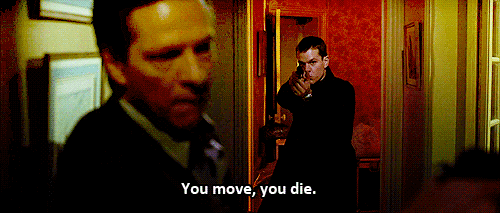


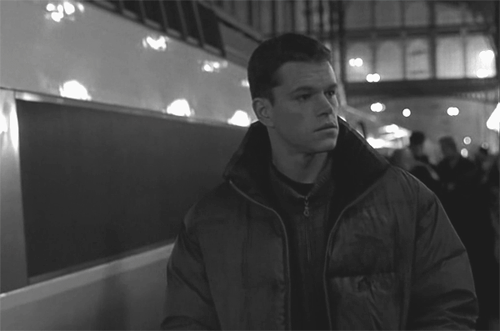








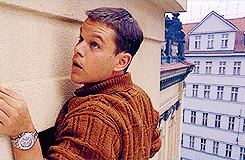
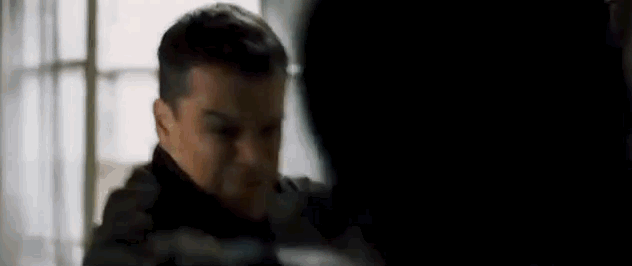
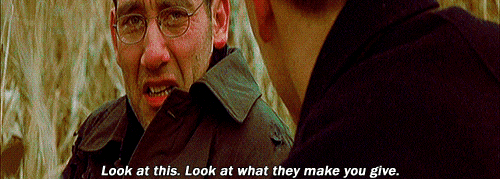
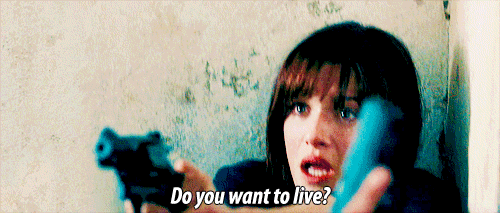



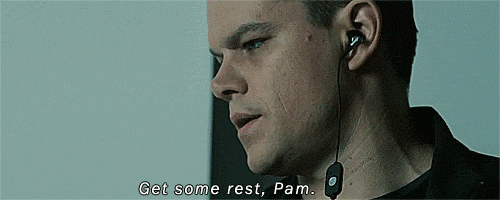
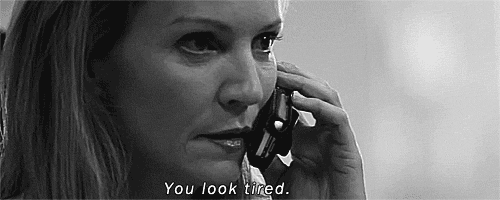

great
ReplyDelete